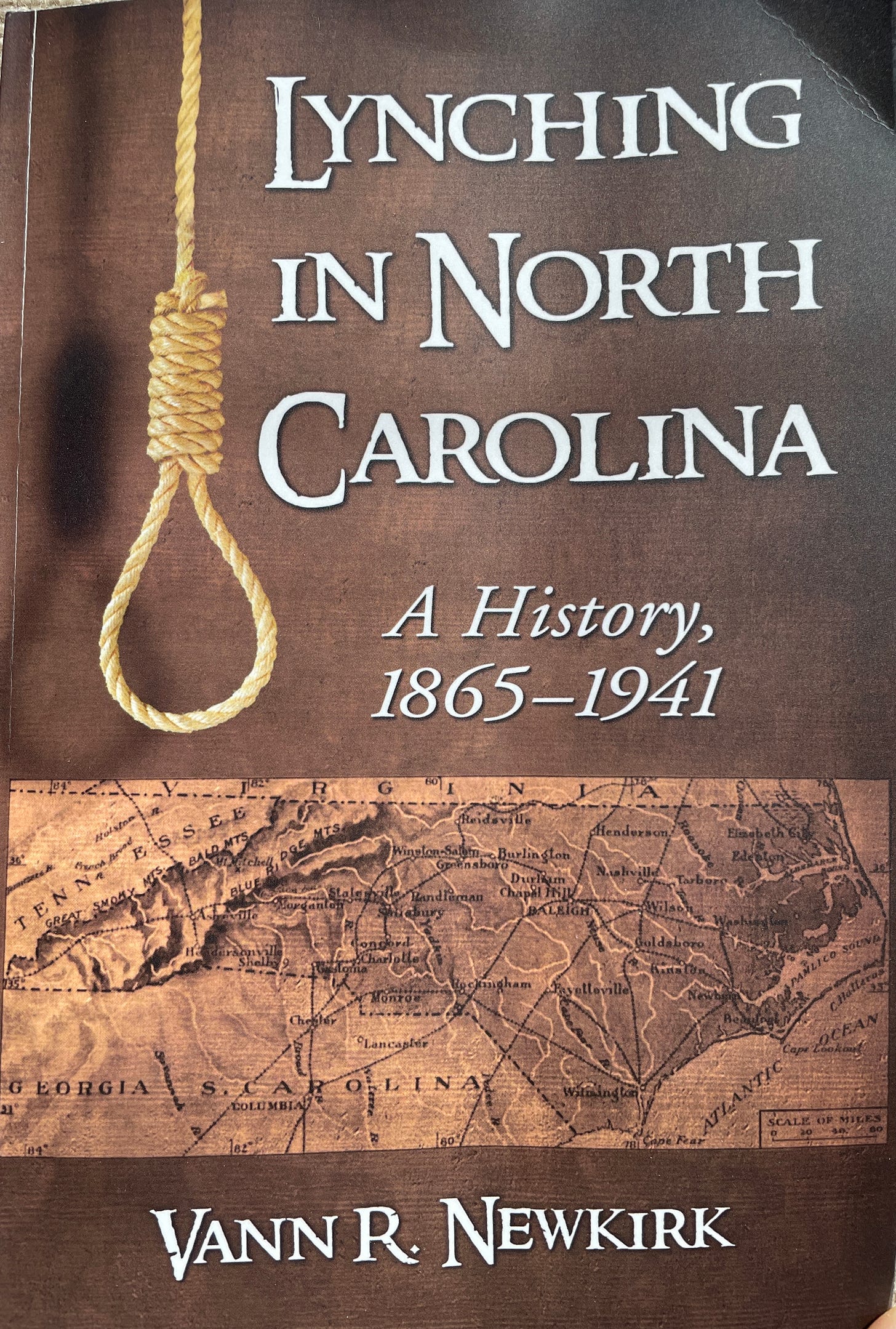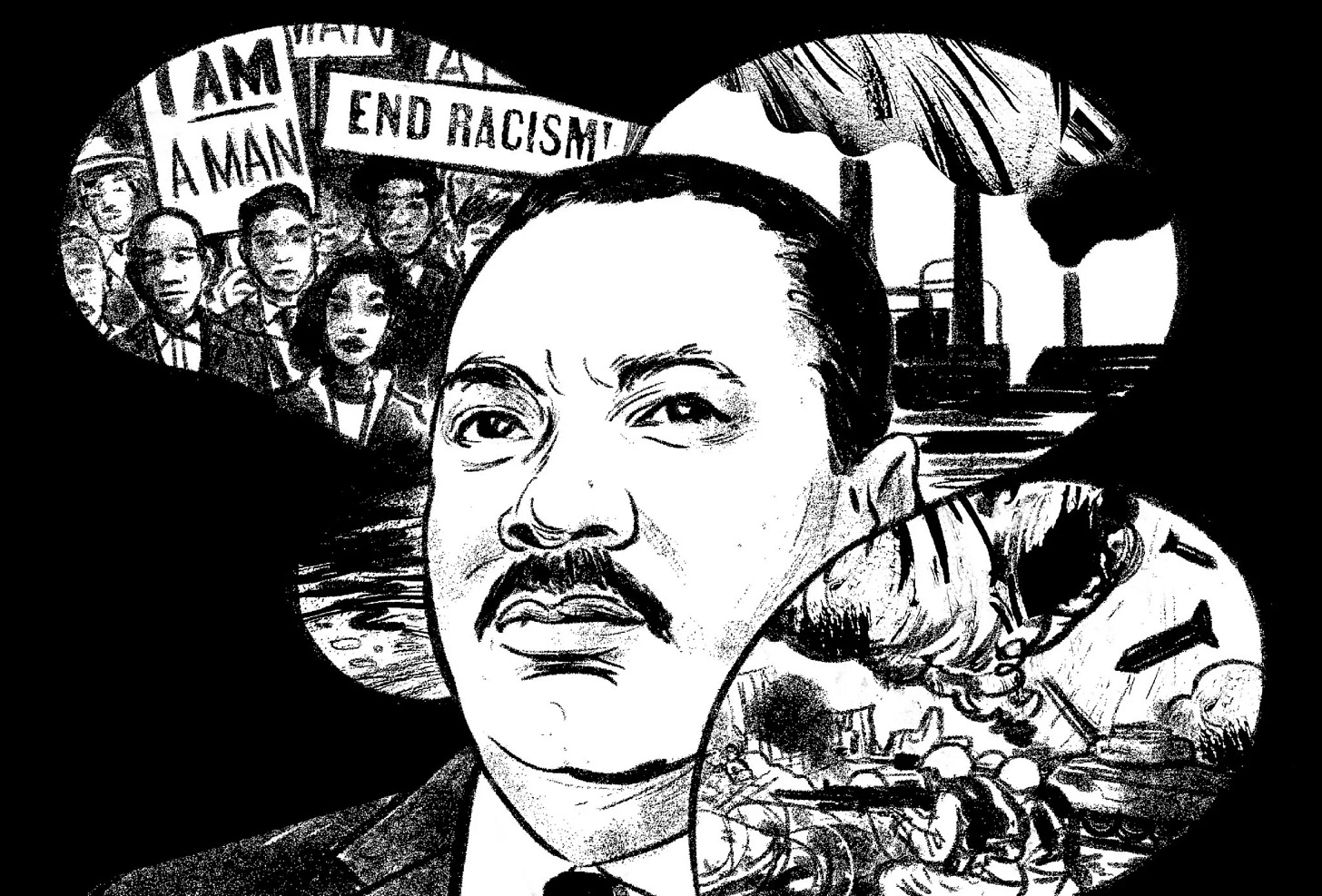When Research Hits Home
The last recorded lynching in North Carolina was committed by two men named Dellinger.
As some of you may know, I’ve been working on a long-term (way-too-long-term) book project on Martin Luther King Jr. as an ecological thinker, cosmological thinker, and prescient prophet of interconnectedness.
Part of why it has taken so long is, well, interconnectedness.
Instead of doing the “smart” thing, and focusing the book narrowly, and publishing quickly—which would have been much better for my “career” (lol; R.I.P), I’ve been trying to make it My-Big-Book-About-Everything.
I want it to be about overlooked aspects of Dr. King’s philosophy; about the Civil Rights Movement, and the women who led it; about cosmology and worldview; about ecology and social justice, and the myriad ways these intersect and overlap; about the emergence and growth of ecological thinking in the 1950s, 60s, and 70s; about the context of settler colonialism, white supremacy, and racial oppression in the United States—a context without which, trying to understand the Black Freedom Movement would be like trying to explain General Eisenhower’s D-Day invasion without mentioning the Nazi occupation of Europe.
I want my upcoming book to be about personhood and community, reverence and respect, animism and interbeing.
I want to give shout-outs and space to previous King scholars who have touched on similar themes (who I did not discover until after I had been researching and speaking publicly about this topic for 10 years)—while also being bold enough to assert that no previous work has come close to pulling together this full vision of what I call “the Ecological King.”
I want to use this King quote, and that one, and this King passage, and that one; to demonstrate the cumulative weight of evidence that interconnectedness and interdependence were not a minor theme for King, but rather, were central to his message, his mission, his worldview and philosophy.
I want the book to be about the ever-increasing Ecological / Climate / Nature / Mass Extinction Crisis, and the ever-more-urgent need to build transformative mass movements for social justice and ecology. (Let’s Planetize the Movement, y’all, before it’s too late.)
I want it to be about the Black and Southern traditions and communities that produced, shaped, inspired, and influenced Martin King, and their deep roots in African cosmology.
I want it to be about Dr. King’s mentor, Howard Thurman; and—I dare say—I think I’ve found even more rhetorical connections between them than I’ve seen mentioned by Thurman scholars.
I could go on. Did I mention democracy? Because Dr. King definitely had a lot to say about democracy, fascism, and authoritarianism.
So, you can start to appreciate why it has taken a while. (Can someone say ADHD? It’s a blessing and a curse; lol.)
Yes, it has been a long journey. Almost a quarter of a century, to be frank. But all the while, I have been sharing big chunks of my research and discoveries, in dozens and dozens of talks and presentations; in interviews; and in a few short articles, including this New York Times opinion essay, “Dr. King’s Interconnected World.”
Yet another reason it has taken so much time is my inner need to feel that I know wtf I am talking about before I publish. Especially on a topic as sensitive, tragic, and blood-stained as the history of racism and racial brutality, terrorism, and oppression in the United States; and particularly when writing about lineages and traditions that are not my own.
In the 12 years since I finished my doctoral dissertation on this topic, I have uncovered a lot more new information that I think really pulls the argument and thesis together. I now have twenty points—twenty categories of examples—that demonstrate exactly what I mean when I say “the Ecological King.”
For the last couple years I have been organizing, collating, re-familiarizing myself with, and synthesizing this daunting mountain of research. It is finally ready to be written up and pushed out the door, and I am committed to getting it done.
But I still cannot help myself from doing more research as I go.
In 2023 I traveled to the Woodruff Library in Atlanta, Georgia, and spent an enthralling few days poring over a small sliver of the more than 11,000 documents in the Morehouse College Martin Luther King Jr. Collection.
I found some fascinating material in Morehouse College’s King archive, including some intensely racist letters King received in the last weeks of his life, which I think of as ‘the hate mail of a marked man.’
I also got to hold, in my unworthy hands, numerous books from Dr. King’s 1000-volume personal library, and page through them, noting King’s underlining, marginalia, and doodles. (Yes, MLK doodles!)
I want to go back there and do some more research. (No, Drew. Can’t go back. Must. Finish. Book.)
From the David Mamet play, “Glengarry Glen Ross,” comes the famous phrase, “Always Be Closing.”
My motto seems to be, “Always Be Researching.”
And, in that spirit, last week I purchased a book by Vann R. Newkirk, Lynching in North Carolina: A History, 1865–1941.
When the book arrived, while looking at the cover, I thought to myself, it seems the last recorded lynching in North Carolina happened in 1941. That is the year my dad was born in Charlotte, North Carolina.
Flipping inside to the page that chronicles this atrocity, I found a connection that hit even closer to home.
[Content warning: racist epithet and racist violence]
Vann R. Newkirk writes:
“The most serious incident of the era was the lynching of a twenty-three-year-old black man named Robert Melker in Cherryville. The incident that led to Melker’s death began on April 13, 1941, when a car occupied by four young white men passed Melker and his wife as they walked along side the highway. As the car passed, one of the men yelled at the couple and Melker replied. Unfortunately, this angered the men and they stopped the car and began to throw rocks at the Melkers until the couple retreated into their home. At this point Melker’s mother grabbed a shotgun and fired at the attackers, sending the men scurrying for safety. However, this did not end the day’s drama. As soon as the white men reached their homes, they grabbed their shotguns. Then they returned to the Melker’s home and called for Melker to come out. When he refused, one of the men shouted, ‘We’ll kill every G_ _ d N*gger in here if we have to.1 At this point Melker opened the door and the men unleashed their fury by firing several shotgun blasts into his body.”
The four men were arrested the next day by law enforcement in Gaston County and charged with killing Robert Melker.
Their names?
Haywood Dellinger.
Graham Dellinger.
Fred Hudson.
Robert Sellers.
Aged 23-28 years old.
As far as I can tell, it doesn’t seem that I am related to these Dellingers. A quick look does not turn up any direct links. They don’t appear to be part of my Dellinger family line (shout-out to Hans Dellinger, born circa 1610 in Dillingen, Germany).2
But as we know, ultimately, everything is connected. And ‘Dellingers in North Carolina’ hits very close to home.
Concerning the aftermath of this appalling and tragic racist murder, Newkirk writes that, despite confessions from Haywood Dellinger and Robert Sellers,
“Many feared that the men still might go unpunished, since North Carolina had never convicted a white man for lynching an African American. But on this occasion these fears were unwarranted.”
Ten days after the death of Melker, all four men pled guilty in exchange for having the charges reduced to second-degree murder. The shooters, Haywood Dellinger, Sellers, and Hudson, were sentenced to prison terms of 18-25 years, while the driver of the get away car, Graham Dellinger, was given a 14-year sentence.
In conclusion, writes Newkirk,
“The Melker case marked a turning point in North Carolina. For the first time in state history white men charged with participating in the lynching of a black man were convicted and sentenced to prison. Such action undoubtedly sent a message to others that North Carolina was serious about ending the reign of Judge Lynch.”
I think part of why we are where we are…
… teetering on the edge of totalitarianism (again); suffering a resurgence of loud-and-proud bigotry, racism, Jim Crow-ism, and misogyny in our public, media, and political spaces (again)—is because far too many of us (myself included) don’t know our history.
We do not realize how precious are the rights, freedoms, and kinship we take for granted. We scarcely remember that some things are worth standing for, living for, fighting for.
But the research, and the struggle, continue.
I have reproduced Newkirk’s original text precisely, with the exception of an asterisk I added to the racial epithet. I’m confused as to exactly what the “G_ _ d” is meant to signify. Perhaps “God damn”?
I’m so grateful to Anne Leightner Kienlen for her genealogical research and documentation.





Totally appreciate the depth of your commitment, your integrity and thoroughness, Drew!
Everything you write and share is immensely valuable and educational.